Music and miracle
15 August 2013
English Translations of Cubans Writing From the Island
My friend Victor gave me a lovely poem.
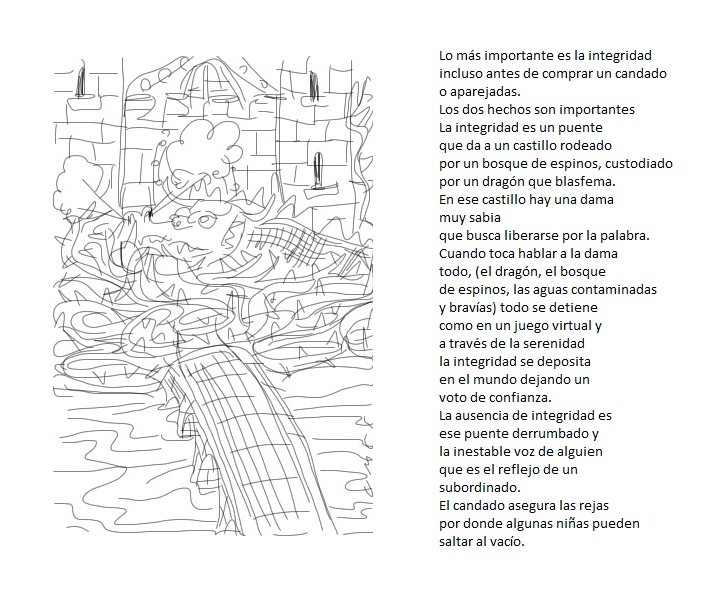
The most important is integrity
even before buying a padlock or
pullys.
Both facts are important
Integrity is a bridge
that leads to a castle surrounded
by a forest of hawthorns, in custody of
a blasphemous dragon.
In this castle there is a woman who is
very wise
who tries to liberate herself with words.
When it is the woman’s time to talk
everything (the dragon, the forest
of hawthorns, the contaminated
and wild water) everything hesitates
like a virtual game and
through the serenity
integrity settles
in the world leaving a
vote of confidence.
The absence of integrity is
this bridge demolished and
the unsteady voice of someone
who is the reflection of a
subordinate.
The padlock secures the gates
through which some girls might
leap into the emptiness.
16 August 2013
Womanhood and motherhood is a blessing. As women we are faced with many challenges in any part of the world despite the indisputable social advancements in the past decades, but one forgets when one fights to support* a family, including if you live in a country like Cuba, wretched thanks to the decision of a group of people; where on top of that everything is organized in such a manner that the difficulties and challenges are constant however planned the life you lead is. The matter is complicated much more if you are poor. Now maternity is not so fun, even though you bear it with that “the children didn’t ask you to bring them to Cuba.”
You can still be happy with three requisites: woman, mother and poor. The hair really starts to get knotted with the fourth requirement: to be black.
Everything gets complicated.
Cuba, the beautiful and racist island of the Caribbean, where it is natural to be black and poor.
If a black woman dresses well and has money, many Cubans probably believe she is a well-known artist or athlete. She’s not one of those? Weird! Does she have a foreign husband? Of course! In these cases it is recommended that one gets used to the title “girl from the streets with luck,” even though she is more demure than an angel and with more merits than a Nobel Prize. Through these reflections the Japanese Junko Tabei arrived, born May 23, 1939, in the prefecture of Fukushima. She became the first woman to reach the summit of Mount Everest, on May 16, 1975.
I am convinced that we need the courage and tenacity of this incredible mountain climber. So we, the Cubans of African descent, can occupy the place we deserve in Cuban society with full rights. And these places must be conquered with much sacrifice. This respect to which we aspire is as steep as the will of Junko Tabei. If the goal is not as high as Everest, we will lose our way. In reality there are very notable Cubans of African descent, even though nothing changes. Inevitable we have to follow the route of Junko Tabei. Without sparing strength, without receiving applause. Struggle with faith against the eternal blizzards, the intolerable exhaustion…and the habit of always seeing ourselves as so humble, so conflicted.
8 August 2013
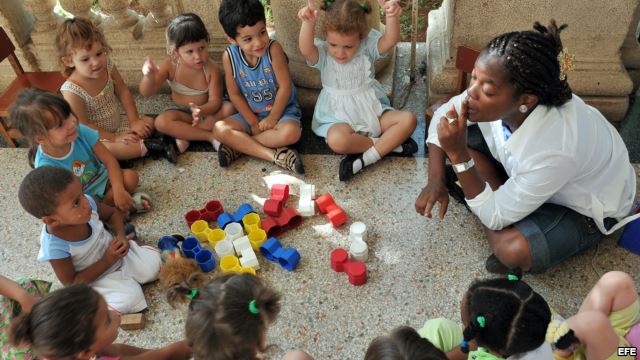 The possibility of getting a place for a child in a childcare center in Cuba has become a real search for the impossible. The small capacity in these nurseries, the bad food, and the reduction in the requirements of admission for women who work in the ministries of Public Health and Education make many see that goal as a chimera.
The possibility of getting a place for a child in a childcare center in Cuba has become a real search for the impossible. The small capacity in these nurseries, the bad food, and the reduction in the requirements of admission for women who work in the ministries of Public Health and Education make many see that goal as a chimera.
The childcare centers and kindergartens were implemented at the beginning of the ’60s, so that Cuban parents could work without worrying about the care of their kids. But in the last years, these educative centers have been converted into something exclusive, above all in some interior regions of the country where approximately one exists in each municipality.
Without the syndicate’s recommendation, the support of the Federation of Cuban Women and other sources that have leverage, it’s impossible to obtain a space in these places.
Mildred Sánchez, a nurse who resides in the coastal municipality of Antilla, in Holguín Province, could never put her kids in a childcare center since she had not graduated.
“The solution now are the girls who haven’t gone to university and don’t have work, so they take care of children,” says Mildred.
These youngsters “take care of children less than one year because the mothers have to work, and they go with them and take care of the babies. Here on my block live two 16-year-old girls who are taking care of babies, one has three babies in her house and the other has four,” she affirms.
The alternative of private nurseries first passed by the rigor of state inspectors,
who fined those who ran them, until the last attempts at reform included them as a mode of “self-employment.”
In the capital, an employee of these nurseries can earn a salary of almost 40 CUC a month, and, in addition, they are guaranteed a free lunch.
In Antilla, where Mildred lives, there is a childcare center, divided into two parts, “one in front of the other. They are the private homes of people who have emigrated from the country,” Mrs. Mildred Sánchez concludes.
Yanisleidis Rodríguez, a mother in Havana, is a worker and a dissident at the same time. She has a black mark against her, and it would be impossible for her to get a place in a childcare center. “Before being in this (she is referring to the opposition), I didn’t have the right, and now I have even less,” she remarked. She has two children, one who is 7 and another who is 4.
“To think that I worked in Provincial Education and even so they wouldn’t give me a place for my children. There with me were mothers who spent many years working in Education and had to pay a person to take care of a child so they could work,” she indicated.
Corruption has penetrated this sector, as Yanisleidis recounts, who asserts that mainly being a director or having a good recommendation makes it possible to obtain the precious placement for a child in these places.
The concern over enrollment for the children of Yuliet Pérez, a resident in Pinar del Río and an ex-worker at the Provincial Hospital Abel Santamaria, came up against a concrete wall.
“When I had my first girl I asked and never got a reply,” she says, and she adds that neither were there careers for educators in childcare centers, which also affected the availability of these services.
From Havana, the independent journalist Álvaro Yero Felipe denounced on the Digital Spring website that “six workers in a childcare center in the Arroyo Naranjo municipality sent a letter to the National Director of the Ministry of Education in Havana, where they accused the administration of the center of diverting food and economic resources and materials meant for the children,” said the publication.
Yero reported that the incident took place in the Luxil childcare center, located in Arroyo Naranjo, and the letter related the diversion of “resources that the government received from foreign humanitarian organizations for the children who are boarding there, under state authority because they don’t have families.”
The children are under state custody, and their principal support is the agency of security and protection, SEPSA, and they are not older than five years of age.
Translated by Regina Anavy
25 June 2013
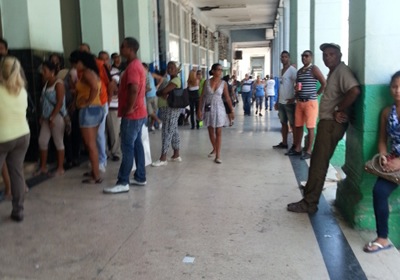
They don’t have their own places, but they flourish everywhere. They lend money at interest, facilitate loans, and charge the same in cash as in goods and services. They are the new moneylenders. After being stigmatized for decades, these banned bankers have returned without licenses or pity. They offer everything from small amounts to thousands of convertible pesos, although the latter is only for very reliable clients. They operate in areas they know well; they know how much their neighbors make in wages, whether they receive remittances from overseas, or if they have some other source of income. Starting with this information, they distinguish between those who will be “good for it” and those who won’t. Although there can always be surprises. The great nightmare of these “usury experts” lies in the customers’ intentions to board a boat and be smuggled out of the country, without returning to them what is theirs.
Other situations can be resolved with pressure and threats. When a debtor is overdue in his payments, the lender feels that the time has come to teach him a lesson.
Edward was watching television last Saturday when they knocked on his door. Two burly men pushed past him into the house and one of them hit him in the face with his fists. They took the stereo and left, but not before warning him, “You have 72 hours to pay back El Primo… if you don’t, we’ll be back and we won’t behave so nicely.” The victim could not go to the police, because, from the beginning, he preferred illicit credit, without possible complications. He spent the next three days selling some of his home appliances and going into debt to friends so that he could repay the loan. He also prayed a little that El Primo and his henchmen might be raided for the great number of crimes they commit.
María, however, obtained a loan of 10 thousand pesos from the Metropolitan Bank. She needed to fill out endless forms and present written evidence of her employment. She planned to use the money for construction materials to remodel her old house. She felt satisfied to have gotten the sum legally, although now any paperwork she fills out includes the information that she is in debt to the State. Others, who could not meet the requirements, had to accept the conditions and interest rates of their neighborhood moneylender. More than one client has had to pay with favors from her own body when the repayment date has come and gone; more than one family has had to deliver a refrigerator or a car, because an irresponsible member thought to ask for money they could never repay.
As necessary as he is slandered, the moneylender is just one link in the illegal financial chain of our reality. Cautious when giving, implacable when collecting.
15 August 2013
These days on the television screens, fortunately, they have dedicated one of the few existing channels to broadcast (usually delayed but sometimes live) the competitions from the 2013 World Athletics Championships, which are being held in Moscow.
To enjoy this magnificent spectacle, we must disregard the Cuban narration. What for everyone else is a competition, is for our officials “a battle.” While all the athletes from other countries came to participate with brains, legs, arms, etc., the Cubans came to “fight with heart in hand” (something very difficult and uncomfortable in my view).
The “Cuban warriors” seem disconcerted by the noise in the stadium, which is strange for people who live in a country like ours where there is so much noise at all hours, while athletes from other countries do not seem distracted. This was the case with the pole vaulter Yurisley Silva; that’s why the favorite failed, according to our commentators. The same thing happens with public pressure, which seems to affect only Cubans, and not competitors such as Elena Isimbaeva, who was not only going for the gold, but after already announcing her retirement–reasons to be under more pressure, yet she nevertheless got it.
Finally, what I find most ridiculous is that when a Cuban participant earns a medal, it is rare that it is not dedicated to Fidel, rather than to the athlete’s family. I’ve never seen any athlete from another country dedicate a medal to the leaders in power instead of to their loved ones. Another thing that caught my attention, to conclude my disquisitions, is that when a Cuban wins a bronze medal, it usually shines brighter than gold.
To tell you the truth, as much as I like sports, I have to consciously prepare myself not to get infuriated at the bias, the yelling, and the crassness that usually accompany the commentary of Cuban broadcasters, experts in sports and euphemisms.
Translated by Tomás A.
14 August 2013
Text and Photos: Nilo Julián González Preval
[From LFR: Today begins a series of photographs and texts from the experimentalist artist, Nilo Julián González Preval. My blog, Crossing the Barbed Wire, opens its windows to the artists and writers on the island. On this occasion Nilo presents us with a text, which is nothing more than a photo-reportage on daily life, “if you want it and believe it,” he told us from Havana.]
“Today I went to visit your aunt. I don’t know why this week I haven’t been able to stop thinking about her. How can you live well in Holguin? She is fine. As fine as you can be in an institution of blankets and loneliness. I brought her a pudding and some sweets. A soft drink of mate. I slipped when I was getting out of the truck and looked to see who was laughing. The first one to laugh was going to get it. Gracefulness was what cost me our divorce. Is she very nice? She doesn’t ask me for anything. That is how people lie and lie without any reason. I know that you told me the truth. That you went, and I am grateful to you for the sincerity, although my heart was broken, until Miguel appeared, and it’s not that he is a watchmaker but he took me out of the hole and we could both advance. Are you following what is going on with the Party and politics? In the factory they’re talking about a Chinese boat that Cuba was hiding to make war in America and for the trafficking of arms and other things. I know that this separates us. I was thinking only of the family and about food for our children. As for their education…my politics is a united family and some children who will know that, for me, homeland means the love of my children. Their kisses every morning.
“What is her name? If you ask me to I’ll send you dulce de leche with your cousins who are truckdrivers.
“A big kiss.”
Lavidaenrosas@gmail.com
Translated by Regina Anavy
12 August 2013
“Look! Look how the people support us! You say that the people condemn us…look how the people support us.” This is what Zuleidys Perez Velasquez repeated on Monday, August 5th to the members of the State (In)Security when the bus that carried 14 detained opponents passed through the center of Holguin.
The opposition leaned their heads out of the windows and yelled “Down with the dictatorship, Down with the Castros, Long live human rights!” and the majority of the people on the sidewalks and streets supported with their cheers, arms and jumps.
Zuledys Perez Velazques, national president of CID (Independent and Democratic Cuba) and a group of activists from various organizations had gone to the provincial offices of State (In)Security in Agramonte street between Area and Libertad in front of the San Jose Park, to protest the abuse against Ramon Zamora Rodriguez and other members of the opposition.
When they arrived, a mob of more than 200 people waited for them with an act of protest. Zuleidys, Danai Mediola Duquesne and Julio Cesar Ramos Curbelo, as representatives of the group, headed to the offices of Stte (In)Security to demand an explanation for the act of protest. Major Eliseo ordered that they could not be there.
Zuleidys responded that they were not going to leave until they were given an explanation of those who the henchman said were people who had gathered on their own accord and that they (State (In)Security) were there to protect the opponents to public disturbance.
She responded that they wouldn’t move until they received an explanation and that she had video and witnesses that it had been he who had taken workers out of La Casona (a business of construction materials and an adjoining bakery) so that they would protest.
Realizing that he’d been discovered, the henchmen Eliseo made a signal to the mob to start up again. The opponents linked arms together. In response to this attitude, he gave orders for the arrests and the men and women were put onto the bus with punches and pushing.
When they arrived to the Center of Operations in Pedernales they were detained for three hours in the summer sun inside the metal bus. Later they were let off one by one to be interrogated. They were put into very cold and very hot rooms until 9 at night when they began to be released. Julio Cesar was threatened, told that they would go to his house and give him a beating.
They savagely beat Juan Zacarias Verdecia, 63 years old and nearly blind. Zacarias’s mouth is destroyed and his ribs are bruised and he was released 8 kilometers away in the neighborhood of Guirabo. Since he can barely see, he walked for three hours to arrive back to Holguin.
Zuleidys stated that the meeting had been called for all the organizations to come to an agreement to support each other in cases of repression and in reality the agreement was accomplished through action, it was a success that they facilitated with their abuse.
The reuinion was celebrated in the house of Ramon Zamora Rodrigues, representative of the Orlando Zapata Tamayo National Front for Civic Resistence. Before all the opponents arrived the dictator had assembled an act of protest and the henchmen took several out of the house by force, among them Zamora, and terrorized the women and children.
The 43 opponents detained on Monday, August 5th, 2013 in Holguin were:
Zuleidy Lisbet Pérez Velázquez
Carmen Oropesa Ramírez
Rosa María Naranjo Nieves
Danai Mendiola Duquesne
Yolanda Pérez Días
Marisol Pupo Rodríguez
Damaris García Martínez
Berta Guerrero Segura
Magdelivia Pelegrino Guerrero
Liliana Campos Bruzón
Livia Hernández Pérez
Maidolis Leiva Portelles
Julio Cesar Ramos Curbelo
Alexander Marrero De La Rosa
Alexei Jiménez Almarales
Jorge Luis Recio Arias
Emir José Bermúdez Pérez
Julio Cesar Albares Marrero
Luis Jaime Meriño
Mauricio Martínez Días
José Luis Ricardo Soberats
Yuri Miguel Carralero Vázquez
Bernardo Cintero Gonzales
Gilberto Solí Gonzales
Ramón Zamora Rodríguez
Maylin Ricardo Góngora
Pedro Leiva Góngora
Juan Sacaría Verdecía
Rafael Leyva Leyva
José Isidoro Urbino Zaldívar
Mairin Pozo De La Torre
Yosbanis Pupo Pérez
Fidel García Roldan
Franklin Pelegrino Del Toro
Rubier Cruz Campo
Yolangel Pupo Pérez
Ricardo Rodríguez Feria
Amauri Güero Mora
Roberto Gonzales Hernández
Eladio Pupo Nieves
Arlenis Rodríguez Ávila
José Luis Mir Cruz
Amilkar Pérez Riverón
7 August 2013
Reinaldo Arenas, the genial writer from Holguin, the dissident against all the banners he saw fluttering before his path. Those homelands of Marti that he could rewrite, Cuba, his immense sorrow, and the night, that friend who accompanied him up to that final hour in which we all find ourselves.
I have two homelands: Cuba and the night.
By Reinaldo Arenas
Both plunged in a single abyss.
Cuba or the night (because they are the same).
They both confer the same reproach
In the foreign land, of a braggart ghost.
Until your own fright is an illusion,
A lost wheel of a foreign coach
that rushes into a cataclysm
where breathing is itself a waste.
The sun has no light and it would be cynicism
that the time you were living was for loveliness.
If that is the homeland (the homeland, the night)
that has left us centuries of egoism,
I await another homeland, that of my madness.
*Translator’s note: The title of this poem is the first line of a poem by José Martí, titled “Two Homelands.”
Translated by Regina Anavy
24 July 2013
I have just come from the corner of 13th Ave. and 8th Street in the heart of Little Havana. There the activist for human rights, Jesús Alexis Gómez, and the leader of the Democratic Movement, Ramón Saúl Sánchez, have been carrying out for 17 and 10 days, respectively, a hunger strike. Their goal is to call the world’s attention so that the Governor of the Bahamas frees and stops torturing the Cubans who are detained there, when they arrived on the coast in search of a longed-for liberty.
Ramón Saúl Sánchez took advantage of the occasion to exchange words with his organization’s activists and give instructions about the strategy to be followed. In the state in which he finds himself, he writes his opinions about the boycott of the Bahamas and the purpose of the strike.
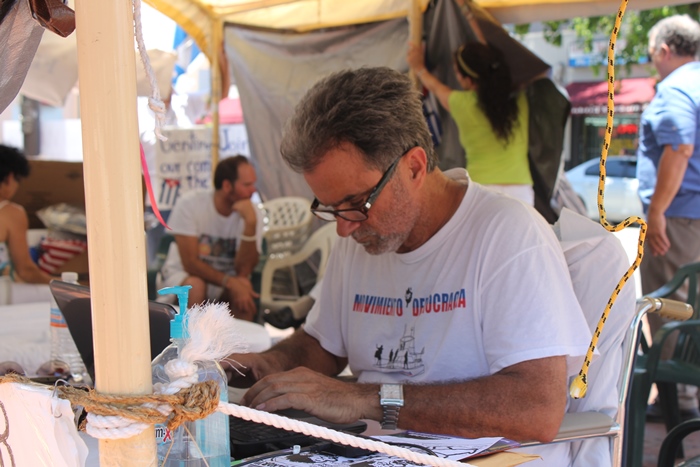
The leader of the Democratic Movement continues his work to call for the world’s attention and solidarity with the prisoners now in the Bahamas.
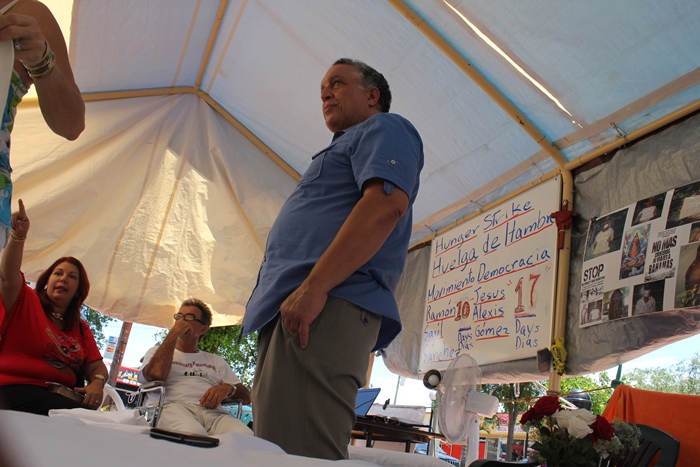
An activist, upon leaving church this Sunday, went to the tent to offer a Christian prayer for the strikers and the prisoners in the Bahamas.
The demands go from the cessation of torture to the unconditional release of the detainees in the Bahamas, without sending them back to Cuba.
Translated by Regina Anavy
4 August 2013